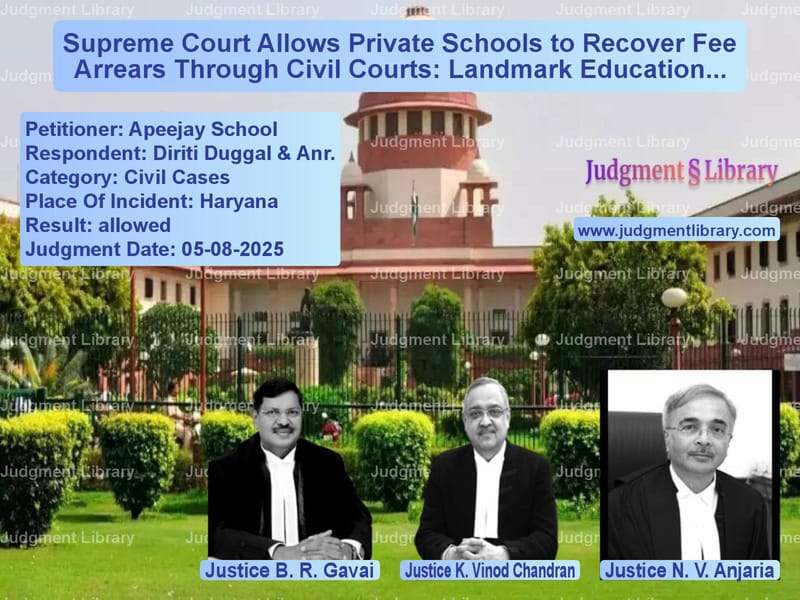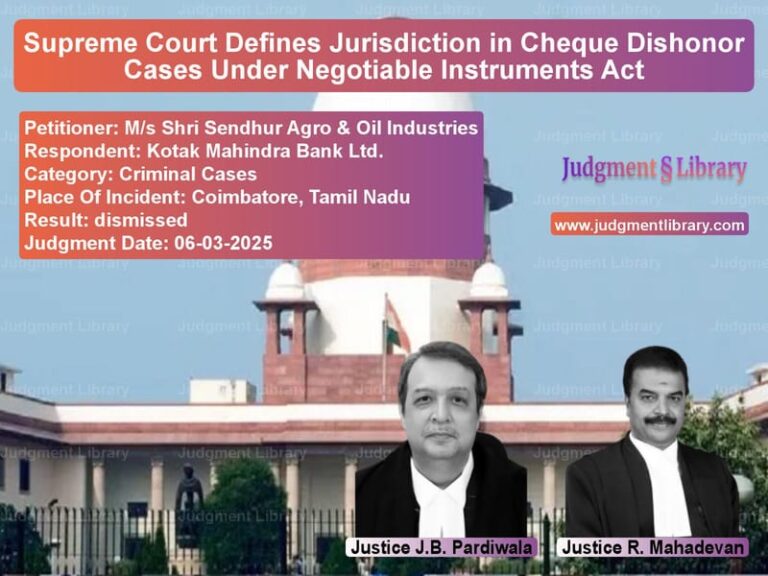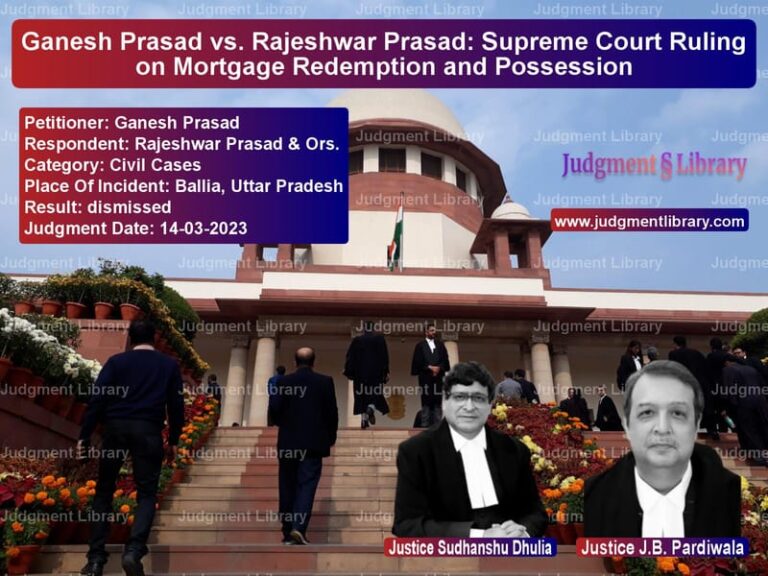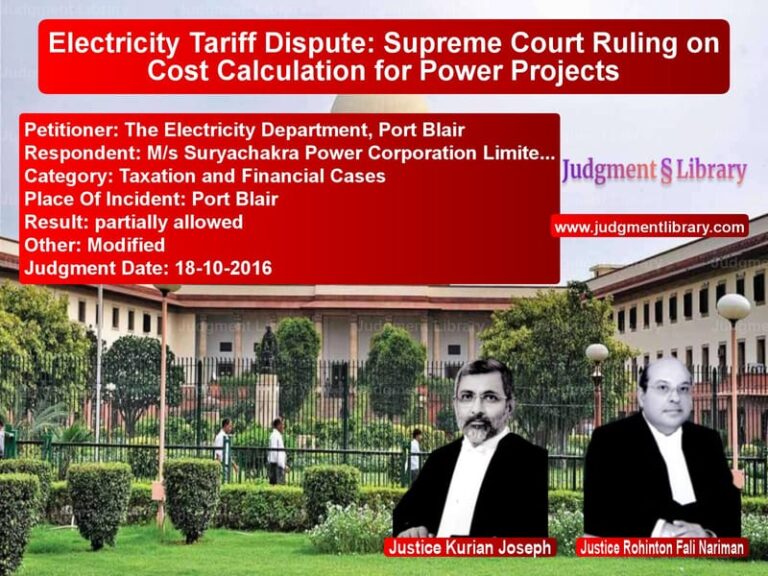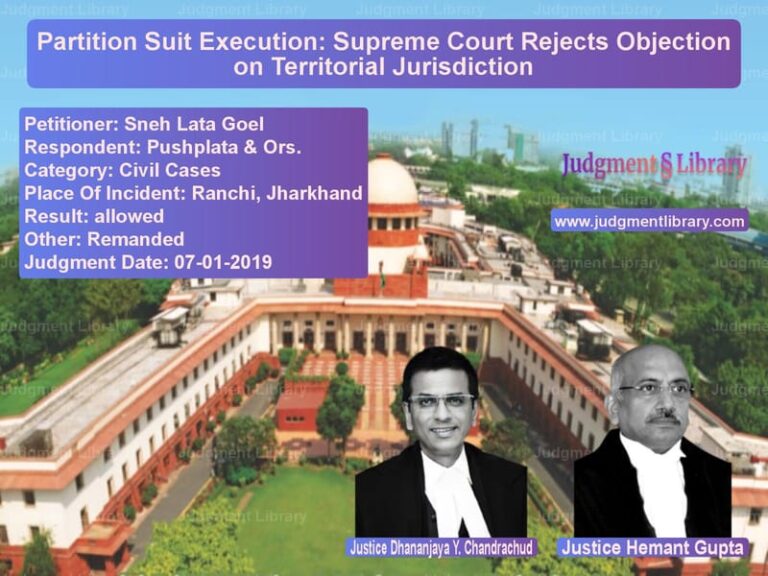Supreme Court Allows Private Schools to Recover Fee Arrears Through Civil Courts: Landmark Education Case
In a significant judgment that clarifies the jurisdiction of civil courts in fee recovery matters, the Supreme Court has ruled that private unaided schools can approach civil courts to recover fee arrears from parents and students. The landmark decision, which involves Apeejay School’s long-standing dispute with parents over fee hikes, establishes that statutory mechanisms for fee regulation do not automatically oust the jurisdiction of civil courts when schools seek to recover legitimate fees. The Court’s ruling balances the rights of educational institutions to recover their operational costs with the protective mechanisms available to parents against arbitrary fee hikes, creating a harmonious framework for resolving fee-related disputes in the education sector.
The Fee Dispute That Spanned Over a Decade
The legal battle began in 2009-10 when Apeejay School implemented a fee hike that led to a dispute with parents. While students continued their education at the school, parents paid only the pre-hike fee amount, leading to accumulated arrears. The school eventually filed suits for recovery of these fee arrears, which were decreed by the trial court with minor modifications by the appellate court. However, the High Court of Punjab and Haryana intervened, holding that the civil courts had no jurisdiction in such matters due to the existence of an alternative remedy under the Haryana School Education Act, 1995, and the Rules framed thereunder. This prompted the school to approach the Supreme Court, challenging the High Court’s finding of jurisdictional ouster.
The Legal Arguments Before the Supreme Court
Before the Supreme Court, Sh. H. L. Tiku, learned Senior Counsel appearing for the appellant school, made several compelling arguments. He pointed out that “the fee hike was notified to the students and there was never a complaint raised before the educational authorities.” He emphasized that “there is no ouster of jurisdiction as was found by the High Court especially since the remedy provided, even under the newly incorporated provisions in the year 2014 was to the students or their parents to approach the FFRC to ventilate their grievance of unreasonable and excessive fee hike.” Crucially, he argued that “there was no remedy available to the school as such, to enforce a reasonable hike in fees, which the students/parents were obliged to make good for the educational and other facilities provided by the school.”
On the other side, Mr. Santosh Kumar Tripathi, learned Senior Counsel appearing for the respondents, contended that “though the violation of Rule 158; that is the absence of a proper notification of the fee hike was raised before the civil court, in defence of the prayer for recovery of money, the civil court rubbished it relying on Section 22 of the Act.” He also raised the ground of limitation, arguing that “at least with respect to the earlier academic year, the suits are clearly barred on the ground of limitation.”
The Regulatory Framework and Fee Committee
The Supreme Court examined the historical context of fee regulation in Haryana. The Government had initially issued a notification capping fee hikes at 20% in every successive academic year, which was successfully challenged by schools’ associations. The High Court had struck down this cap but observed that educational authorities could intervene if they found instances of profiteering, commercialization, or charging of capitation fees. Subsequently, the High Court appointed committees to examine fee hike justifications, and based on these judicial pronouncements, the Haryana School Education Rules were amended in 2014 to introduce Rules 158A and 158B, establishing the Fee and Fund Regulatory Committee (FFRC).
The Supreme Court’s Analysis on Jurisdictional Ouster
The Supreme Court conducted a thorough analysis of whether the statutory framework ousted the jurisdiction of civil courts. The Court noted that “Rule 158A provided for the constitution of the FFRC who can adjudicate upon any complaint received or on suo moto motion, after due enquiry with regard to charging of capitation fee or excessive fees, direct such institutions to refund the capitation fee or excessive fees levied and collected.” However, the Court crucially observed that “The power conferred on the Committee is confined to a complaint regarding levy of capitation fee or charging of excessive fees which can be raised only by a parent or a student. There can be no claim raised by the school before the FFRC to enforce payment of fees by a student or a parent.”
Based on this analysis, the Court concluded that “There can hence be found no express or implied ouster of jurisdiction of the civil court.” The Court further examined Section 22 of the Act and held that “Section 22 of the Act also ousts the jurisdiction of the civil courts only in matters where the Government or its officers have been empowered to adjudicate upon. The recovery of fees by an institution from the students or parent, is not a power conferred on the Government or its authorities by the statute or the rules prescribed.”
Addressing the Limitation Argument
The Supreme Court also dealt with the respondents’ contention that the suits were barred by limitation. The Court noted that the cause of action for the school arose after the disposal of the appeal against the judgment that had struck down the government’s fee hike cap. The Court held that “When the challenge to the government order succeeded and the appeal filed by the State was also disposed off; without any interference to the judgment of the Single Bench, then the suits were filed in 2014 within the period of limitation; the cause of action having commenced with the disposal of the appeal. The ground of limitation hence fails.”
The Protective Mechanism for Parents
While allowing the school’s recovery suits, the Supreme Court emphasized the protective mechanisms available to parents. The Court noted that the trial court had rightly made the recovery subject to the outcome of the FFRC’s decision. However, the Court found that the appellate court’s direction for refund of entire amounts if the FFRC found in favor of the students was excessive. The Court clarified that “if the decision of the FFRC is in favour of the students/parents, it can only inure to their benefit, to the extent to which the fee hike is interfered with by the FFRC.”
The Final Ruling and Its Implications
The Supreme Court allowed the civil appeals, restoring the trial court’s order with the modification that interest would be payable at 6% as modified by the appellate court. The Court significantly noted that “the audit of the school in respect of the subject academic years has been completed by the FFRC and no illegality, arbitrariness or unreasonableness was found in the hike proposed and notified by the school.” While this audit report was not formally on record, the Court found that the trial court’s mechanism of subjecting recovery to the FFRC’s decision provided adequate protection to parents.
Broader Impact on Education Jurisprudence
This judgment has far-reaching implications for the education sector in India. It establishes that while statutory mechanisms exist to protect parents from arbitrary fee hikes, these mechanisms do not preclude schools from approaching civil courts for recovery of legitimate fees. The decision recognizes the practical reality that schools need certainty in fee recovery to maintain their operations and educational standards. At the same time, it preserves the rights of parents to challenge fee hikes through the specialized statutory mechanism of the FFRC. The judgment creates a balanced approach where civil courts can enforce fee recovery while statutory committees determine the reasonableness of fee hikes, ensuring that both educational institutions and parents have effective remedies to protect their respective interests. This harmonious interpretation of the statutory framework provides much-needed clarity to educational institutions, parents, and courts dealing with similar disputes across the country.
Petitioner Name: Apeejay School.Respondent Name: Diriti Duggal & Anr..Judgment By: Justice B. R. Gavai, Justice K. Vinod Chandran, Justice N. V. Anjaria.Place Of Incident: Haryana.Judgment Date: 05-08-2025.Result: allowed.
Don’t miss out on the full details! Download the complete judgment in PDF format below and gain valuable insights instantly!
Download Judgment: apeejay-school-vs-diriti-duggal-&-anr.-supreme-court-of-india-judgment-dated-05-08-2025.pdf
Directly Download Judgment: Directly download this Judgment
See all petitions in Education Related Cases
See all petitions in Contract Disputes
See all petitions in Consumer Rights
See all petitions in Debt Recovery
See all petitions in Judgment by B R Gavai
See all petitions in Judgment by K. Vinod Chandran
See all petitions in Judgment by N.V. Anjaria
See all petitions in allowed
See all petitions in supreme court of India judgments August 2025
See all petitions in 2025 judgments
See all posts in Civil Cases Category
See all allowed petitions in Civil Cases Category
See all Dismissed petitions in Civil Cases Category
See all partially allowed petitions in Civil Cases Category

